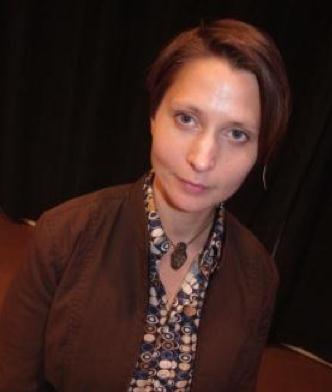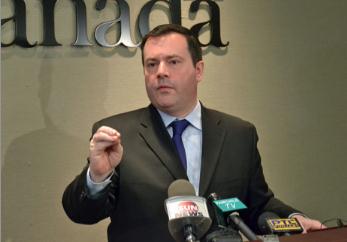
Sharalyn Jordan, a member of the board at the Vancouver-based Rainbow Refugee Committee. Credit: Xtra file photo
Citizenship and Immigration Minister Jason Kenney is on the defensive, telling Xtra he is surprised by the angry reaction to the email he sent out Sept 24 touting the government’s plan to protect the rights of gay and lesbian refugees.
The email, sent to thousands of gay and lesbian Canadians, was titled “LGBT Refugees in Iran,” and began with the salutation, “Friend.”
That’s because, he maintains, those who received the email had once signed a petition about gay refugees that generated an automated response to his office. He also suspects some recipients of his email had previously contacted his office.
Kenney rejects comments from some who said his email was “creepy,” because it appeared to target gay and lesbian people.
“Quite honestly, I’ve been in Parliament for 15 years and I’ve never seen a more ridiculous reaction to an issue than people objecting to being corresponded with by a parliamentarian’s office after having contacted that office on that issue with their email address,” he says.
While she says privacy issues are important, Rainbow Refugee Committee’s Sharalyn Jordan is far more concerned with the content of the email and the changes included in Bill C-31, an omnibus bill on Canada’s refugee system.
In the email, Kenney says he is working closely with the Rainbow Refugee Committee to sponsor gay refugees for resettlement to Canada.
But Jordan calls the email “pinkwashing” and a blatant attempt to create a negative shift in public opinion toward Iran by highlighting the homophobia faced by queer people there.
“We were very concerned that the letter singled out Iran,” she says. “There are over 78 countries with criminal sanctions against gay, lesbian, bi and trans people. There’s no need to be singling out Iran. There are five other countries and two states with the death penalty.”
Likewise, Jordan says the federal government has ignored her committee’s advice on refugee protection for queer people.
The Rainbow Refugee Committee has serious concerns regarding the so-called safe country list. She says some countries on it have laws protecting sexual minorities that are rarely enforced and do little to change social discrimination in the culture.
“Having a designated country list profoundly undermines fairness for queer refugees,” she says. “He doesn’t have to look at the human rights record at all to designate it.”
A good example is South Africa, she says, which has constitutional protection around sexual orientation, “yet organizations there report frequent cases of corrective rape that police are unable or unwilling to investigate.”
Kenney says countries that do not normally produce refugees will get a “safe country” designation. “It is a standard feature of the asylum systems in virtually all liberal democracies.”
Designating some countries as “safe” helps prevent the high number of asylum claims that are determined to be false, he says.
“Look, we have a fair and generous legal system to determine whether asylum claims are founded or not,” he says. “The test is whether or not the claimant has a well-founded fear of persecutions.
“You cannot have an asylum system that simply accepts the veracity of every claim that’s filed. That would be just an advertisement to the world to fabricate a false claim.”
But Jordan says there’s “not a shred” of evidence to support saying there are any more false claims for gay and trans refugees than any other group.
“There is a real narrative around the threat of bogus inland claimants,” she says.
Kenney says the Immigration and Refugee Board (IRB) does not make arbitrary decisions, so refugees must produce some evidentiary basis for a claim of persecution. “You can’t just walk in and say, ‘Trust me, I’m being persecuted.’ People need to be able to demonstrate that persecution.”
That’s part of the problem, Jordan says. Many gay refugees seeking asylum have been forced to stay deeply closeted, hiding their sexuality under the weight of personal shame and stigma.
“Proving that is why LGBT claims are the most challenging,” she says. “No other kind of claim requires people to give out such intimate and often traumatizing details of their lives.”
She says some members of the IRB are not adequately trained to assess sexual minorities and gender-nonconforming people. They often use Western stereotypes of queer people, some are homophobic and most don’t understand the gender spectrum.
Federal judge James Russell recently criticized refugee adjudicators, rebuking them for relying on stereotypes to determine the sexuality of refugee claimants. “Behaviours which establish a claimant’s homosexuality are inherently private,” Russell said.
Under the new system, asylum-seekers will have 15 days, instead of 28 days, to produce their claim before their case moves to a hearing. Hearings, which previously took 19 months, now occur within 30 and 60 days, depending on whether the refugee hails from a “safe” country.
“That’s completely unworkable,” Jordan says. “People will go before their hearings unprepared. In the slower process, we already see refugees not being able to provide adequate evidence.”
In some cases, she says, the refugee board doesn’t see evidence that proves the risk of persecution. “We’ve seen people sent back to real violence. We’re very fearful this will happen far more frequently under the new system.”
Bisexual claimants face a systemic discrimination, she says. “That’s because IRB members have a hard time understanding the validity of identity. Some of the stereotypes of bisexuals feed into the idea that they could go back home and discreetly be safe. That’s not a valid decision. We need a better understanding of the range of queer sexuality, and that people don’t fall into neat little categories.”
Kenney is skeptical. He says that if cases are denied, the IRB probably had a good reason. “Very often we see media coverage of the uncorroborated story of the claimant, without looking at what the federal judges have seen.”
Still, Kenney says one of his first meetings when he became minister four years ago was to meet with Helen Kennedy of Egale, who raised concerns surrounding the evidentiary standard the IRB uses for gay refugees.
Following that meeting, he says, he arranged to get IRB decision-makers better training on assessing the veracity of gay claims. “When the gay community has raised these concerns with me, I’ve responded the only way I can, which is to encourage the IRB to make sure they are being especially sensitive to the nature of gay claims.”
Kennedy was not available for comment.

 Why you can trust Xtra
Why you can trust Xtra


